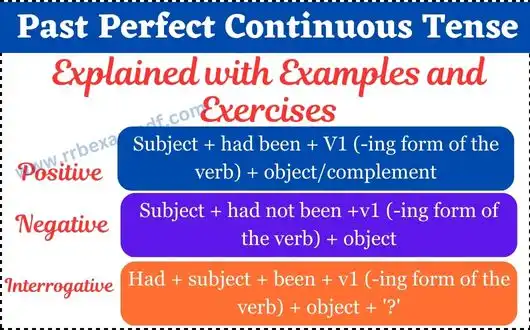Past Perfect continuous Tense: The Past Perfect Continuous tense is a valuable tool in English grammar that enables us to describe ongoing actions or events that started in the past, continued for a duration, and ended before another past action. Whether you’re an English learner or someone seeking to enhance their language skills, understanding the different types of sentences and their formulas within the Past Perfect Continuous tense is essential. In this article, we will delve into the various sentence structures, provide formulas for each, and offer practical exercises to solidify your understanding.

Types of sentences in Past Perfect Continuous Tense
| Sentence Type | Formula | Example Sentences |
|---|---|---|
| Affirmative | Subject + had been + present participle (-ing form of the verb) + object/complement | 1. She had been studying for hours before the exam. 2. They had been working on the project since morning. |
| Negative | Subject + had not been + present participle (-ing form of the verb) + object/complement | 1. He had not been sleeping well for weeks. 2. We had not been practicing the piano lately. |
| Interrogative | Had + subject + been + present participle (-ing form of the verb) + object/complement + ‘?’ | 1. Had he been working on the project all night? 2. Had they been traveling since morning? |
| Interrogative Negative | Had + subject + not been + present participle (-ing form of the verb) + object/complement + ‘?’ | 1. Hadn’t she been working on the project for weeks? 2. Hadn’t they been studying English regularly? |
Types of Sentences:-
The Past Perfect Continuous tense encompasses four types of sentences: affirmative, negative, interrogative, and interrogative negative.
1. Positive/Affirmative Sentences
Affirmative sentences in the Past Perfect Continuous tense express ongoing actions or events that started in the past, continued for a duration, and ended before another past action. The formula for constructing affirmative sentences is as follows:
Subject + had been + present participle (-ing form of the verb) + object/complement.
Example:
Kavya had been studying for hours before the exam.
They had been working on the Major project since morning.
Exercise 1:
Create five affirmative sentences using the Past Perfect Continuous tense.
2. Negative Sentences
Negative sentences in the Past Perfect Continuous tense negate ongoing actions or events that started in the past, continued for a duration, and ended before another past action. The formula for constructing negative sentences is as follows:
Subject + had not been + present participle (-ing form of the verb) + object/complement.
Example:
David had not been sleeping well for weeks.
We had not been practicing the piano lately.
Exercise 2:
Convert the following affirmative sentences into negative sentences using the Past Perfect Continuous tense:
a) She had been running for an hour.
b) They had been studying Spanish every day.
3. Interrogative Sentences
Interrogative sentences are used to ask questions about ongoing actions or events that started in the past, continued for a duration, and ended before another past action. The formula for constructing interrogative sentences is as follows:
Had + subject + been + present participle (-ing form of the verb) + object/complement + ‘?’.
Example:
Had she been working on the major project all night?
Had they been traveling since morning?
Exercise 3:
Rewrite the following sentences in the Past Perfect Continuous tense as interrogative sentences:
a) She had been waiting for the bus for 30 minutes.
b) We had been practicing yoga for years.
4. Interrogative Negative Sentences
Interrogative negative sentences in the Past Perfect Continuous tense ask questions about ongoing actions or events that did not happen before another past action. The formula for constructing interrogative negative sentences is as follows:
Had + subject + not been + present participle (-ing form of the verb) + object/complement + ‘?’.
Example:
Hadn’t she been working on the project for weeks?
Hadn’t they been studying English regularly?
Exercise 4:
Convert the following affirmative sentences into interrogative negative sentences using the Past Perfect Continuous tense:
a) Thomas had been playing football for two hours.
b) We had been working in the garden all morning.
Also Read: Tenses in English Grammar with examples
Past Perfect continuous Tense
You have now gained mastery over the Past Perfect Continuous tense. By understanding the different types of sentences, their formulas, and practicing the exercises, you have honed your ability to express ongoing actions or events that started in the past, continued for a duration, and ended before another past action.
Exercise Answers:
Exercise 1:
He had been studying for hours before the exam.
They had been working on the maojor project since morning.
He had been practicing the guitar all afternoon.
We had been waiting for the bus for a long time.
I had been cooking dinner when they arrived.
Exercise 2:
a) She had not been running for an hour.
b) They had not been studying Spanish every day.
Exercise 3:
a) Had she been waiting for the bus for 30 minutes?
b) Had we been practicing yoga for years?
Exercise 4:
a) Hadn’t he been playing football for two hours?
b) Hadn’t we been working in the garden all morning?



